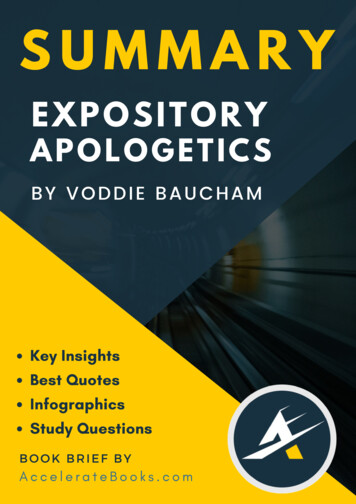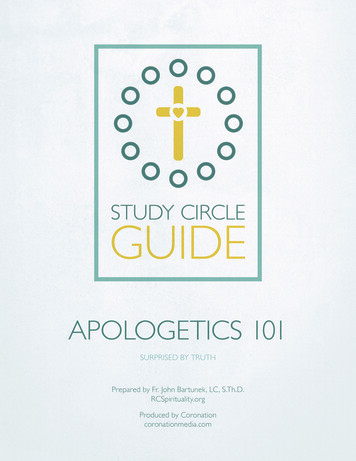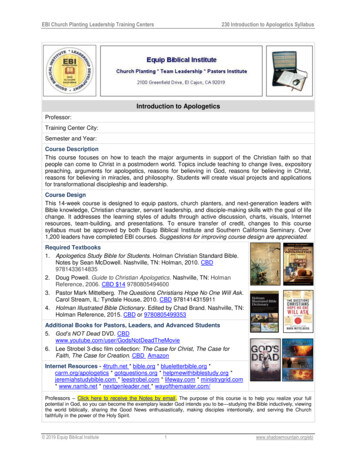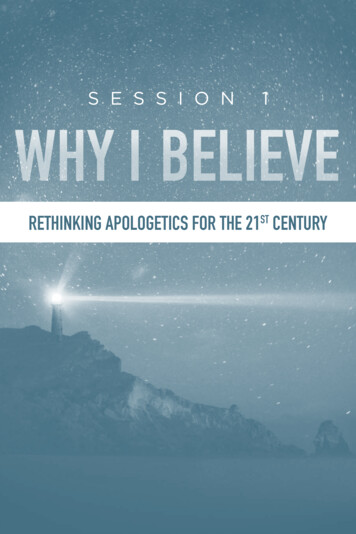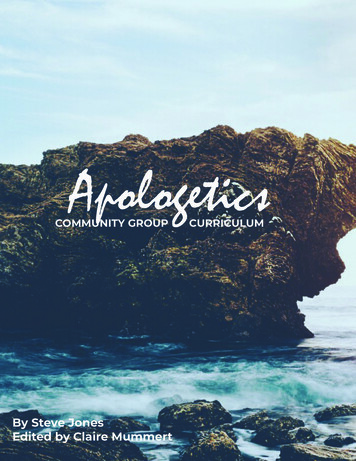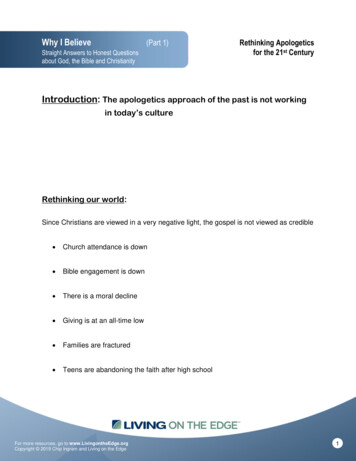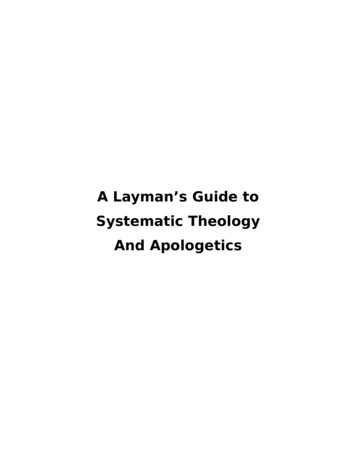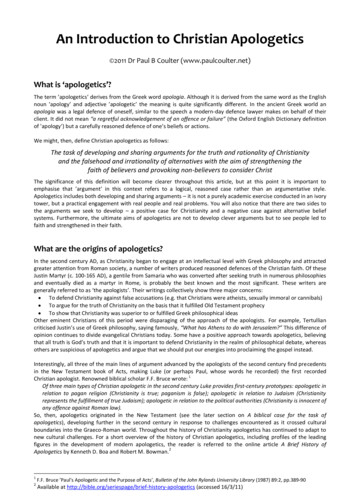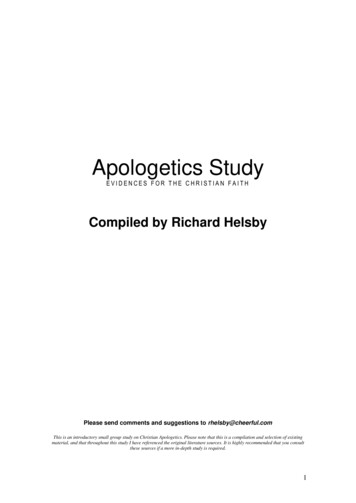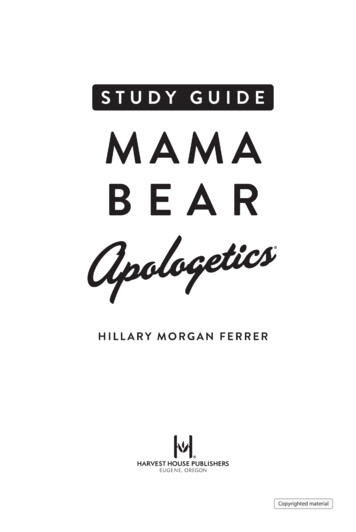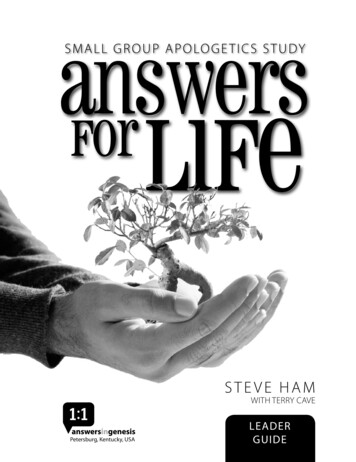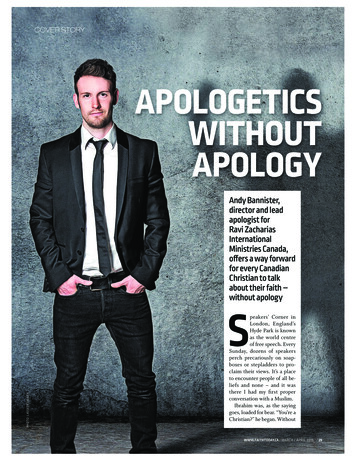
Transcription
COVER STORYAPOLOGETICSWITHOUTAPOLOGYAndy Bannister,director and leadapologist forRavi ZachariasInternationalMinistries Canada,offers a way forwardfor every CanadianChristian to talkabout their faith –without apologyPHOTO: LASSEDESIGNENSpeakers’ Corner inLondon, England’sHyde Park is knownas the world centreof free speech. EverySunday, dozens of speakersperch precariously on soapboxes or stepladders to proclaim their views. It’s a placeto encounter people of all beliefs and none – and it wasthere I had my first properconversation with a Muslim.Ibrahim was, as the sayinggoes, loaded for bear. “You’re aChristian?” he began. WithoutWWW.FAITHTODAY.CA / MARCH / APRIL 201529
COVER STORYTHERE’S A GROWING ANXIETY THATEVANGELISM ISN’T POSSIBLE INSECULAR, PLURALISTIC CANADA.hundreds of conversations withpeople like Ibrahim, and full-timeministry with Ravi Zacharias International Ministries (RZIM). Firstlaunched 30 years ago in Canada,RZIM is committed to evangelismundergirded by apologetics as weseek to engage the thinking skeptic.THE DREADEDE AND A WORDSEvangelism and apologetics rankhigh on the list of what makesChristians nervous. There’s a growing anxiety that evangelism isn’tpossible in secular, pluralisticCanada (or only if we carefullydisguise it so that our non-Christian friend doesn’t realize whatwe’re doing until it’s too late). Ifpeople have even heard of apologetics (that branch of Christian theology concerned with giving reasons30WWW.FAITHTODAY.CA / MARCH / APRIL 2015Andy Bannister, Canadian directorand lead apologist for Ravi ZachariasInternational Ministrieswhy Christians believe what theydo), they often perceive it to beabout dry, dusty arguments in ivorytowers, or about trying to arguepeople into the Christian faith.This is a tragedy.We live in a cultural momentwhen the need for apologetics – anda fresh vision and passion for evangelism – is greater than ever. Hereyou will find a primer for apologetics– why it is needed and what I havelearned works in today’s Canada.ARROGANCE ANDCERTAINTYThere is only one good reason tobe Christian, and that’s if the gospel is true. And if it’s true, thenpresumably you can give reasonswhy. But we live in an age wheremany people fear truth, especiallytruth with a capital T. Last year, Iinterviewed the Unitarian Universalist chaplain of a leading university for a documentary. He stressed,again and again, that certainty ledto arrogance. This was his basicproblem with Christians, especially the evangelical variety. “If I everfind myself more than 60 per centcertain of anything,” Jeff said, “Ibegin to worry.”The fear of appearing arrogant,intolerant or narrow-minded hasPHOTO: RAVI ZACHARIAS INTERNATIONAL MINISTRIESpausing for breath he launched intoa laundry list of objections to Christianity, beginning with the Trinity,taking in the Crusades, and thenlanding on the reliability of theBible. “Your Scriptures have beencorrupted! Only the Qur’an hasbeen perfectly preserved and is thetrue word of God! Allahu Akbar!”I went home with my head spinning, with no idea how to answerIbrahim’s questions. I’d never metsomebody with such passionateobjections to my faith. Nothing inmy ten years as a Christian hadprepared me.But I knew there had to be answers.The journey to finding them,which began that rainy afternoonat Speaker’s Corner in 1997, ledeventually to full-time theologicaleducation, a PhD in Islamic studies,
crept into the Church. One of themost common questions I hearfrom Christians, especially university students, is, “How can I talkabout the uniqueness of Jesuswithout looking like a bigot?”It fascinates me that in all myyears of dialoguing with Muslims,I have never been accused of arrogance. I have been told I am wrongand misguided. I have had manypassionate discussions with peoplelike Ibrahim. But never – not once– has a Muslim told me I am narrow-minded for my insistence thatit is through Jesus, not Muhammad,that salvation is to be found.A friend of mine passionatelydebated with a Muslim at Speakers’Corner. An elderly atheist gentleman wandered up to them and said,“You religious people. Always arguing!” The Muslim stopped, midflow, put his arm round my friendand replied, “This man and I believein God. You do not. This man and Ibelieve in prophets. You do not. Thisman and I believe in miracles. Youdo not. This man is my friend. Youare not. Now go away.”Befriending and talking withthose who follow other religionsactually helps us see the uniquenessof Christianity. The widespreadidea in our culture that the majorreligions of the world are fundamentally the same, with just superficial differences, is not true. It isthe differences, in fact, that arefundamental. If we ignore the differences, we ignore the person.There’d be nothing to learn ifthey’re just a carbon copy of me. Ifwhat they believe is different, thenI need to get to know them.THE OPPORTUNITYDISAGREEING BRINGSEverybody makes truth claims:Muslims, Hindus, Buddhists, athe-Five common FAITH CHALLENGES and how you can answer themTHEY SAY: “Science hasTHEY SAY: “ReligionTHEY SAY: “If thereTHEY SAY: “ChristiansTHEY SAY: “You’re onlyYOU ASK: “What wouldYOU ASK: “What aboutYOU ASK: “What do youYOU ASK: “Tell meYOU ASK: “So what aboutThings to think aboutHuman beings havean uncanny ability totake a whole range ofthings – science, politics,economics, sexuality,technology (and, yes,religion) – and use themfor great evil. Ratherthan blame the thingsthemselves, perhaps theproblem lies within us.Further readingDouglas Wilson, God Is.How Christianity ExplainsEverything (AmericanVision, 2008)Things to think aboutIf there is no God, termslike ‘good’ and ‘evil’ reallyjust collapse to personalpreference. The atheistcan say, “I don’t likemurder,” but not “Murderis wrong.” Instinctively,most of us recognizeevil when we see it. Andwhen we experience evil,what we want is notsomething said about evil,but something done. Andthat’s what the cross is allabout.Further readingRavi Zacharias and VinceVitale, Why Suffering?Finding Meaning andComfort When LifeDoesn’t Make Sense(FaithWords, 2014)Things to think aboutBehind many people’srejection of the gospel isoften not an intellectualobjection, but badexperiences with theChurch or Christians. Weneed to take the time tolisten, understand andthen show a differentside to Christianity.Behind every question is aquestioner, and unless weremember that, we’ll endup obsessed with winningarguments and lose theperson in the process.Further readingRavi Zacharias, HasChristianity Failed You?(Zondervan, 2010)Things to think aboutMany objections toChristianity self-destructwhen you turn themaround and shoot themback at the questioner.If what we believe isdetermined purely by ourculture or upbringing,then everybody (not justChristians) is in the sameboat. Nobody can claimto believe for rationalreasons. And, of course,it wouldn’t explainconversion.Further readingAbdu Murray, Grand CentralQuestion: Answering theCritical Concerns of theMajor Worldviews (IVPBooks, 2014)disproven God.”you say are some ofthe things that sciencecan’t tell us?”Things to think aboutScience has limits. Thereare a whole range ofquestions it can’t answer,from philosophy to math,politics to literature to,most profoundly, whatit means to be human.Science is simply one toolfor investigating reality.The problem is that toa man with a hammer,everything often looks likea nail.Further readingJohn Lennox, God’sUndertaker: Has ScienceBuried God? (Lion UK,2009)poisons everything.”the chaos you can’t pinon religion?”is a God, why is thereevil?”mean by words like‘good’ and ‘evil’?”are narrow-mindedand judgmental!”your story. Whathappened?”a Christian becauseyour parents were!”an atheist whoseparents were atheists?”–ANDY BANNISTERWWW.FAITHTODAY.CA / MARCH / APRIL 201531
COVER STORYists – everybody. My atheist friendsare increasingly confident aboutputting their truth claims out for allto see, whether it’s bestselling booksfrom atheist authors like RichardDawkins, snarky remarks by atheistchat show hosts or secular advertisements on the sides of buses.We live in a world in whichChristianity is under fire from alldirections. But this is a tremendous opportunity. The gospelstands up powerfully in themarketplace of ideas. And themore people are aware of some ofthe competing worldviews on offer, the easier it is to show peoplethat ideas really matter. There isno such thing as neutrality.I received an email from a student at the University of Toronto.He asked whether I could meethim for lunch and answer somequestions about Christianity. Johnfired dozens of objections at mefor a couple of hours. I’d deal withone, he’d shoot another. At the endof our time I racked my brains,trying to think of something Icould leave him with. As heopened the door of his car, I said,“I’ve enjoyed our lunch and I hopesome of my answers helped you.But more than that, I hope you feltthat I treated you with respect and SHOW PEOPLE THAT IDEAS REALLYMATTER. THERE IS NO SUCH THINGAS NEUTRALITY.dignity, despite our profound disagreements.”He told me I had been kind. Ithanked him for his courtesy aswell, despite his clear difficultieswith Christianity. And I knew I hadfound the thought to leave himwith. This is what I said. “The reason I have treated you with respectis I believe that as a human being,you are made in the image of a Godwho created you and loves you, and32WWW.FAITHTODAY.CA / MARCH / APRIL 2015who showed how much He valuesyou by sending His Son, Jesus, todie for you. That’s why I treated youthe way I did. Now, I know that youdo not believe this. In fact, you havetold me three times in the last twohours that you believe humans arenothing more than atoms and particles, that we are just an accidentof biology. But you have not treatedme as an accident. You have treatedme as person of value and significance. In other words, you havetreated me on the basis of myworldview, not yours. For this I amgrateful, but it raises some questions, wouldn’t you say?”SPIRITUAL – BUT NOTRELIGIOUS – CAN BEGOOD NEWSIt’s one thing to engage with atheistor Muslim friends, but what of thepeople who describe themselves asspiritual, but want nothing to dowith organized religion? A friendand I sat in Tim Hortons when aman saw my Bible. He piped up andtold us he was a reincarnation ofJesus’ brother James – and invitedus to a conference to discover ourinner divinity.Spirituality seems to be everywhere. My colleague Ravi Zachariasspoke at McGill University. Wewere warned not to expect a hugeaudience. This was, after all, secular Montreal. Almost 900 peopleturned up. Even the overflow hadan overflow! The organizers hadchosen a great title for the event –“Does Spirituality Matter?”How do we engage this kind ofvague spirituality, one that is dogma- and commitment-free? Paul inActs 17 offers a lesson. Rather thancondemn the Athenians for theircunningly-catch-all altar to theunknown god, Paul uses it as aleaping-off point to the gospel.Lying behind the trend toward ado-it-yourself spirituality in ourculture is the same nervousnessabout truth that we saw earlier, asense that organized religion is toostraight lined, too dogmatic and toomoralistic.But to people like my friend inTim Hortons, who believe spirituality is about the right experience orfeeling, I like to ask, “What aboutthose who haven’t had that feeling?” The very attempt to be inclusive and nondogmatic ends up exclusive. If you haven’t felt what I’vefelt, if you haven’t learned what I’velearned, or, in the case of my Muslim friend, kept the commands thatI’ve kept, then you’re inferior.Jesus, by contrast, is the greatleveller. At its heart the gospel isn’tabout what you’ve done, learned orexperienced. It is about transformation, as Jesus pointed out to Nicodemus. In a culture in which postmoderns are so desperately tryingto find themselves, this is a messagethat can powerfully connect.THE FOUR PRINCIPLES WEALL NEED TO KNOWAt its heart, apologetics is beautifully simple and intricately connected to the heart of the gospel. AsI’ve wrestled with people’s questions, I’ve learned there are anumber of basic principles thatapply time and again, no matterwho I’m talking with.1. Know what you believe. This is achallenge for those of us raised inthe Church, or who have beenChristians for decades. Too oftenwe give how-shaped answers towhy-shaped questions. If somebodyasks you why you are a Christian,giving a narrative of how you became one isn’t always helpful. Manyof our friends want to know whyyou’re a Christian now, today, withall of the challenges to your faiththat daily attack you. What’s yourelevator speech for Christianity?
Now that you know you can do it,here’s how you can GO DEEPERinto apologeticsRZIM SUMMER SCHOOL 2015: Learn from Ravi Zacharias, Andy Bannister and agalaxy of other speakers from June 28 to July 3. This year’s theme is Reducedor Redeemed? What Does It Mean to Be Human? – a hugely importantquestion that affects every area of culture and how we do evangelism in 21stcentury Canada. www.rzimsummerschool.caBURNING QUESTIONS: A six-part TV documentary exploring the big questionsof life (from the existence of God, to faith and science, to the problem ofevil). It aired on Canadian TV last year and the DVD is now available. Alsograb the free study guide designed for churches and small groups. www.burningquestions.caSHORT ANSWERS TO BIG QUESTIONS: A new 50-part series of videos offeringquick answers to a wide variety of questions about the Christian faith.Presented by RZIM’s Andy Bannister and Nathan Betts. www.rzim.orgIDEAS FOR EVANGELISTIC EVENTS: Is your church or organization strugglingfor ideas about how to reach your community? Check out RZIM’s list of ideasat -evangelistic-eventsREADING RESOURCES: If you’re a reader and want to go deeper, check outRavi Zacharias’ and Vince Vitale’s latest Why Suffering? Finding Meaning andComfort When Life Doesn’t Make Sense (FaithWords, 2014); Nabeel Qureshi’sstory of his journey from Muslim missionary to Christian evangelist, SeekingAllah, Finding Jesus (Zondervan, 2014), or look out for Andy Bannister’s TheAtheist Who Didn’t Exist: Or the Dreadful Consequences of Bad Arguments, anew popular-level and funny (yes, apologetics and humour) book on skepticismcoming this fall (Monarch Books, 2015).2. Rediscover the power of questions.We’ve tried to reduce evangelismto formulas or methodologies. Butthe most powerful form of sharingthe gospel is talking to people.Learn to ask your friends what theybelieve (or don’t believe). If a colleague at work is a Muslim, trysaying, “I’ve never really talked toa Muslim before. What do you believe?” Or if a friend self-describesas an atheist, respond, “ ‘Atheist’tells me what you don’t believe. Butwhat do you believe?”3. Engage people’s honest questions.Don’t ignore objections. A fewmonths ago I met Alex, a younguniversity student, who introducedhimself to me as an agnostic. “Iused to be a Christian,” he explained, “but I was raised in a fundamentalist family.” Questionsabout religion were forbidden inhis family and church. Alex beganto read atheist books and eventually abandoned his faith.“But you introduced yourself asan ‘agnostic,’ ” I said gently. “Whathappened?” Alex explained he attended a local atheist group, anddiscovered that they were, in hiswords, “fundamentalists too.”Questioning was not allowed thereeither. Alex told me he didn’t knowwhat to believe or disbelieve anymore. Then, he asked me if Ithought he was lazy. I replied,“There are two types of agnostics.A lazy agnostic is somebody whocan’t be bothered to find the answerto the God question. An active ag-WHAT PEOPLE NEED IS NOT ACLEVER ARGUMENT, BUT TO SEE THEGREATNESS AND ATTRACTIVENESSOF JESUS.nostic is genuinely searching forthe answer, but just hasn’t found ityet.” We talked long into the evening and slowly began to deal withsome of the questions Alex hadburied for so long.4. Finally, we need to know what thegospel really is. That sounds obvious, doesn’t it? A good deal of ourproblems in the Church stem fromforgetting. We’ve allowed the gospel to get tangled up with politicalpositions, culture wars or moralism. As an atheist friend once putit to me, “I know what you Christians are against, but I have no ideawhat you’re for.” A brilliant, if tragic,observation.CLEARING THE GROUNDUltimately, the task of apologetics islargely one of debris clearing – removing the obstacles so people cansee Jesus clearly. Arguments can’tbring somebody to faith, but theycan help create a climate in whichfaith is possible. Ultimately, whatpeople need is not a clever argument, but to see the greatness andattractiveness of Jesus. Our task, andthe task of apologetics, is simply topresent Him as clearly as we can.And then get out of the way. /FTAndy Bannister is the Canadian director andlead apologist for Ravi Zacharias InternationalMinistries Canada.WWW.FAITHTODAY.CA / MARCH / APRIL 201533
Ravi Zacharias International Ministries Canada, o!ers a way forward for every Canadian Christian to talk about their faith Ð without apology S peakersÕ Corner in London, EnglandÕs Hyde Park is known as the world centre of free speech. Every Sunday, dozens of speakers perch precariously o
